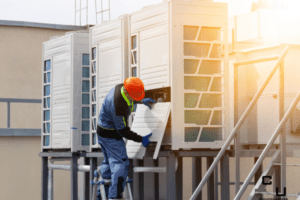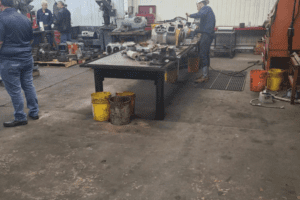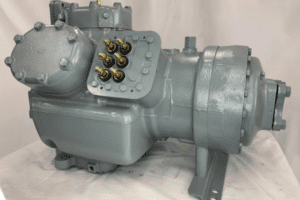All commercial compressor units are rated for a particular climate. Even when your compressor matches the climate, it’s still important to take seasonal temperature variations into account. With the right approach, you can ensure your compressor is ready for the change of seasons.
A lot of attention is given to compressors in the summer, especially in hot and humid climates. While it is definitely true that hot temperatures increase demand, it doesn’t mean the winter months are free of risk. Whether hot or cold, extreme temperatures always have the potential to wreak havoc.
This is especially true for HVAC compressors. No matter whether you are trying to cool or heat an indoor environment, your compressor will be using the same basic principles with refrigerant. Conversely, cold temperatures can lead to a slight efficiency gain for compressors used in commercial refrigeration.
Let’s take a look at some steps you can take:
1. Winterize Rooftop Units
Your commercial compressor is the most important single component within your system, and it is also impacted by all the other components. With that in mind, protecting the rest of your system from harsh weather and freezing temperatures will make a positive difference for your compressor.
Dirt and debris can easily clog the filters in rooftop units. In freezing cold, snow and slush can degrade a system’s performance immediately. Make sure filters are changed out on schedule. Examine all rooftop units after snowy conditions to make sure they have not been blocked.
Heat trace tape can be applied to any exposed areas, drain lines, and pipes to prevent freezing even as temperatures nose-dive overnight. Just remember that in order for heat trace tape to work, you need a power supply. If your facility shuts down completely over the weekend, it will not work.
2. Calibrate Your Thermostats
Thermostats should be calibrated on a seasonal basis, especially if you are using a smart thermostat. The sensors used by smart thermostats can lose accuracy over time. Although they may need to be replaced, they will sometimes come back to life simply by cleaning them according to manufacturer instructions.
Thermostat calibration can be simple or complex depending on the setup you have. If you are using a building management system, check out any built-in tools that help monitor thermostat performance. The more efficient your thermostat, the less effort will be wasted by your compressor.
3. Double-Check Your Operating Environment
Every aspect of your building has the potential to affect other components. If the outer envelope is damaged, for example, drafts can lower the interior temperature. This may reduce the efficiency of a compressor or lead to additional wear and tear. So, make sure your compressor’s immediate environment is sound.
If reduced temperatures are taking you out of the compressor’s optimal temperature zone, you might consider adding a separate heater to the area where your compressor is situated. In the cold, it is also even more important to ensure the compressor is properly lubricated.
4. Perform General Compressor Maintenance
Commercial compressor maintenance is broken down into weekly, monthly, quarterly, and annual tasks. If the weather is changing, odds are good there’s something you need to do. A maintenance plan that is well documented and carefully followed will extend the life of your compressor for years to come.
Now is also a wise time to determine whether you have all the compressor spare parts you need. Having the right spare on hand is the difference between an immediate fix and downtime that could take days. A commercial compressor remanufacturer can advise you on the necessities for your compressor.
As Winter Looms, Plan Ahead for Commercial Compressor Replacement
Today’s commercial semi- hermetic compressors are more durable and easier to service than those of the past. They’ve picked up an additional year or so of service on average, lasting anywhere from eight to ten years. Time rolls on, though, and you can be sure there’ll be some loss of efficiency in the latter half of service life.
While the compressor isn’t usually the root cause of any system failure, extreme temperatures can tip the scales in favor of a breakdown. The best way to prepare for compressor replacement is to identify a commercial compressor remanufacturer you can trust to get you back in service fast.
With a remanufactured commercial compressor, the compressor core is thoroughly cleaned, serviced, and tested. Any damaged components are replaced. At each step, highly trained compressor engineers verify that the remanufactured compressor meets all performance and environmental standards.
Compressor replacements tend to peak in summer and winter, so don’t assume an OEM wholesaler will be able to furnish a replacement in a reasonable timeframe. It can take weeks or even months to get an all-new compressor from a wholesaler – versus a few days and a lower price by selecting a reputable compressor remanufacturing company.












